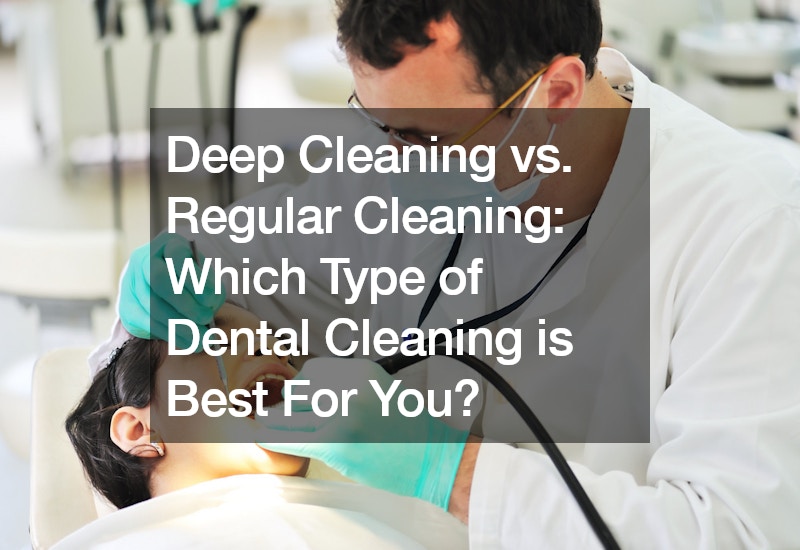When it comes to maintaining good oral health, dental cleanings play a crucial role. However, understanding the differences between deep cleaning and regular cleaning can help you determine which type of cleaning is best suited for your dental needs.
Regular Cleaning:
A regular dental cleaning, also known as oral prophylaxis, is a preventive measure recommended for individuals with healthy gums and teeth. This cleaning, typically performed every six months, focuses on removing plaque and tartar buildup from the surfaces of the teeth.
During a regular cleaning, your dentist or dental hygienist will assess your gum health using periodontal charting, clinical exams, and dental x-rays. These assessments help determine if your gums are within normal limits, with pocket depths between one and three millimeters.
If your gums are healthy and there is no evidence of bone loss, you are eligible for a regular cleaning. This cleaning effectively removes plaque and tartar from the visible surfaces of your teeth, helping to prevent gum disease and tooth decay.
It’s important to note that regular cleanings are recommended for maintaining oral health and preventing disease. They are typically sufficient for individuals with no significant gum or bone issues.
Deep Cleaning:
In contrast, a deep cleaning, also known as scaling and root planing (SRP), is recommended for individuals with gum disease or bone loss. This type of cleaning is more extensive and involves cleaning below the gum line to remove bacteria, plaque, and tartar from deep pockets between the gums and teeth.
Deep cleanings are typically recommended when periodontal pockets are deeper than three millimeters, indicating gum disease or bone loss. During a deep cleaning procedure, the dentist or dental hygienist will numb the area and clean the root surfaces of the teeth to promote gum healing and attachment.
Unlike regular cleanings, which focus on preventive care, deep cleanings are therapeutic and aim to treat existing gum disease and prevent further progression.
Importance of Regular Dental Check-ups:
Regular dental check-ups are vital for maintaining optimal oral health. These appointments allow dentists to assess the condition of your teeth, gums, and overall oral cavity, enabling them to detect any issues early on. During a check-up, your dentist will thoroughly examine your mouth, looking for signs of cavities, gum disease, oral cancer, and other dental problems. By identifying these issues in their early stages, your dentist can implement timely interventions, preventing them from progressing into more severe conditions.
Moreover, regular dental visits enable dentists to track changes in your oral health over time. By monitoring your dental health consistently, they can identify patterns or trends that may indicate underlying issues or areas for improvement. This longitudinal approach to oral care allows for more personalized treatment plans and tailored recommendations to optimize your oral hygiene routine.
Tips for Maintaining Good Oral Hygiene at Home:
In addition to professional dental care, maintaining good oral hygiene practices at home is crucial for preserving the health of your teeth and gums. This includes brushing your teeth twice a day with fluoride toothpaste and a soft-bristled toothbrush to remove plaque and food particles from the surfaces of your teeth. Be sure to brush gently and thoroughly, covering all areas of your mouth, including the front, back, and chewing surfaces of your teeth, as well as your tongue and gums.
Flossing daily is equally important for removing plaque and debris from between your teeth and along the gumline, where your toothbrush cannot reach. Using dental floss or interdental cleaners, gently clean between each tooth and along the sides of the teeth to remove plaque and prevent the buildup of tartar. Additionally, incorporating an antimicrobial mouthwash into your oral hygiene routine can help to reduce bacteria and freshen your breath.
Maintaining a balanced diet rich in fruits, vegetables, lean proteins, and whole grains can also contribute to good oral health. Limiting sugary and acidic foods and beverages can help to prevent tooth decay and erosion, while staying hydrated by drinking plenty of water helps to rinse away food particles and bacteria from your mouth. Lastly, avoid tobacco products, as they can contribute to gum disease, tooth decay, and oral cancer, compromising your oral and overall health.
Which Type of Cleaning is Best For You?
The type of dental cleaning that is best for you depends on the condition of your gums and teeth. If you have healthy gums and no signs of gum disease or bone loss, a regular cleaning is typically sufficient to maintain oral health.
However, if you have deep pockets, gum inflammation, or evidence of bone loss, your dentist may recommend a deep cleaning to treat gum disease and prevent further damage.
It’s essential to follow your dentist’s recommendations for dental cleanings and to maintain good oral hygiene habits at home, such as brushing twice a day, flossing daily, and attending regular dental check-ups.
In conclusion, both regular cleanings and deep cleanings play important roles in maintaining oral health. By understanding the differences between the two types of cleanings and following your dentist’s recommendations, you can ensure that your teeth and gums stay healthy for years to come.
.

